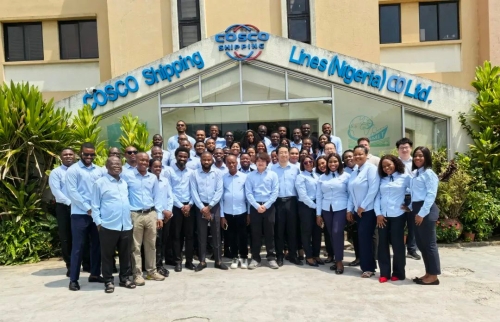News Center
COSCO SHIPPING Establishes First Overseas Warehouse in West Africa
On March 14, the SAGAMU warehouse in Nigeria, a joint venture between COSCO SHIPPING Lines Nigeria and Xiamen C&D Group, commenced operations, signifying COSCO SHIPPING's inaugural warehousing venture in West Africa.

With the establishment of storage hubs in Nigeria, COSCO SHIPPING will meet the "trade front" demands of its clients, significantly reducing the supply chain management cycle. The process is streamlined from the conventional "order - ex-warehouse at loading port - ocean shipping - delivery at destination port" to a direct "order - ex-warehouse & delivery at destination port," thereby accelerating the fulfillment of customer orders and enhancing turnover efficiency.
The successful implementation of the "port-warehouse integration" model not only boosts customer competitiveness but also signifies a proactive approach to deeper integration within the customer's supply chain.
Reports indicate that COSCO SHIPPING Lines Nigeria, in partnership with Xiamen C&D, has successfully completed the feasibility study for the end-to-end warehousing business in Nigeria within 16 months of initiating collaboration in November 2023. This involved thorough on-site evaluations and analyses of several potential warehouse locations around the Lagos Port area, with comprehensive reviews and validations covering aspects such as the mode of cooperation, warehouse location selection, qualification assessments, infrastructure, team building, process development, and risk management. The final agreed-upon plan is to lease the Jiu Long Logistics warehouse for COSCO SHIPPING Lines Nigeria, leveraging the company's expertise to offer import warehousing services and robustly support the swift expansion of its international trade operations.
Moving forward, COSCO SHIPPING Lines Nigeria will persist in developing and launching a series of import and export warehousing projects around Apapa Port and Lekki Port. These projects will encompass a variety of business formats including imports, exports, hazardous goods, containerized cargo, and bulk commodities. The intention is to incrementally replicate this successful model across neighboring West African nations.